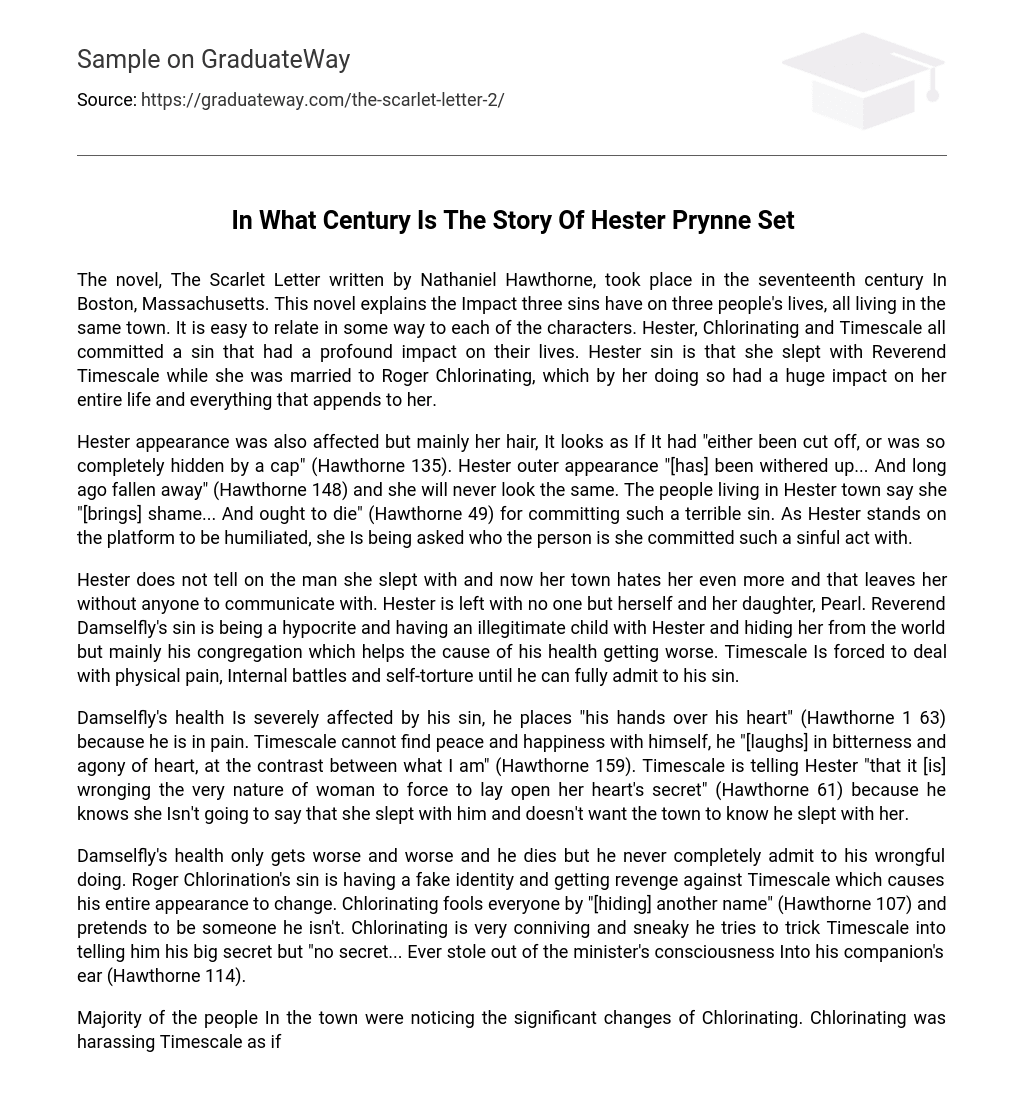The novel, The Scarlet Letter written by Nathaniel Hawthorne, took place in the seventeenth century In Boston, Massachusetts. This novel explains the Impact three sins have on three people’s lives, all living in the same town. It is easy to relate in some way to each of the characters. Hester, Chlorinating and Timescale all committed a sin that had a profound impact on their lives. Hester sin is that she slept with Reverend Timescale while she was married to Roger Chlorinating, which by her doing so had a huge impact on her entire life and everything that appends to her.
Hester appearance was also affected but mainly her hair, It looks as If It had “either been cut off, or was so completely hidden by a cap” (Hawthorne 135). Hester outer appearance “[has] been withered up… And long ago fallen away” (Hawthorne 148) and she will never look the same. The people living in Hester town say she “[brings] shame… And ought to die” (Hawthorne 49) for committing such a terrible sin. As Hester stands on the platform to be humiliated, she Is being asked who the person is she committed such a sinful act with.
Hester does not tell on the man she slept with and now her town hates her even more and that leaves her without anyone to communicate with. Hester is left with no one but herself and her daughter, Pearl. Reverend Damselfly’s sin is being a hypocrite and having an illegitimate child with Hester and hiding her from the world but mainly his congregation which helps the cause of his health getting worse. Timescale Is forced to deal with physical pain, Internal battles and self-torture until he can fully admit to his sin.
Damselfly’s health Is severely affected by his sin, he places “his hands over his heart” (Hawthorne 1 63) because he is in pain. Timescale cannot find peace and happiness with himself, he “[laughs] in bitterness and agony of heart, at the contrast between what I am” (Hawthorne 159). Timescale is telling Hester “that it [is] wronging the very nature of woman to force to lay open her heart’s secret” (Hawthorne 61) because he knows she Isn’t going to say that she slept with him and doesn’t want the town to know he slept with her.
Damselfly’s health only gets worse and worse and he dies but he never completely admit to his wrongful doing. Roger Chlorination’s sin is having a fake identity and getting revenge against Timescale which causes his entire appearance to change. Chlorinating fools everyone by “[hiding] another name” (Hawthorne 107) and pretends to be someone he isn’t. Chlorinating is very conniving and sneaky he tries to trick Timescale into telling him his big secret but “no secret… Ever stole out of the minister’s consciousness Into his companion’s ear (Hawthorne 114).
Majority of the people In the town were noticing the significant changes of Chlorinating. Chlorinating was harassing Timescale as if he was “Satan himself or Satin’s emissary” (Hawthorne 116). Clownishness’s physical appearance started to change drastically, his skin tone got more of a pale evil look to it, his body started to look different. Clownishness’s plan to get revenge on Timescale by using a fake Identity and pretending to be his The focus during the entire novel is Hester Prying, Reverend Timescale and
Roger Clownishness’s sin and how each sin changes their lives throughout the story significantly. In this novel all three characters learn that sometimes dealing with a sin Isn’t always easy but it can be worth it in the long run. It takes a lot of courage to be able to admit such a thing as sin to the entire town but when it is all said and done has the final say so. Take Hester for example, she was humiliated in front of all of those people but at the end of the day, she had her daughter Pearl and was still able to help people out and in some way was blessed.





